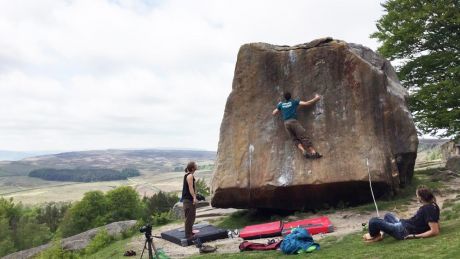
How did you get into climbing?
When I was 20 I watched a very inspiring video on YouTube called “The Insiders” that features some of America’s strong young climbers. After that I started climbing at a small centre in Lincoln. I fast outgrew what that centre had to offer, however, and was already enough of a climbing nut to quit my country lifestyle and move to Leeds, where there was more in the way of climbing. Things really took off from there and thanks to climbing I ended up quitting my job and the rural lifestyle I found boring, and living and working in London.
RECOMMENDED: The Best Places to Go Rock Climbing in London
What’s your most memorable experience?
There are many branches of the climbing tree and I’ve tried most of them; sport climbing, traditional climbing; mountaineering; ice climbing, deep-water soloing… In recent months, however, I’ve been focusing on bouldering in the Peak District. Probably my most satisfying climbing achievement was in Switzerland on a mountain called Piz Badile where there’s a kilometre of perfect granite rock. A friend and I started with a three-hour walk to its base then spent 10 hours climbing and eight hours abseiling through the night to get back on hard ground – not to mention a token night sleeping out beneath the stars without sleeping bags because we couldn’t get back to the car in time.
How has climbing changed you?
Climbing is a lifestyle just like yoga, skateboarding, Parkour and thus the community is really strong – it broadened my friendship group tenfold. My relationship with myself has changed too. I’ve become more driven; I commit myself to training, which makes me fitter as well as happier.
How have you fared injury-wise?
I’ve been lucky to avoid major injury so far. When you start climbing though, your skin will tear and everything just seems to hurt all the time! But it’s important to remember that everyone goes through this and it does ease. That doesn’t mean ignore it though – climbers do need to listen to their bodies.
What’s the biggest challenge?
Fear. You’re tied to a rope, scaling a rock face [or high up on a man-made indoor face], trusting your life to a combination of your equipment and your climbing partner. Who wouldn’t be scared? Even bouldering is scary because although you climb much shorter distances, usually with the aid of a crash pad, you have no rope and you might fall anywhere between two to four metres.
What about the mental aspect?
When I’m climbing there are plenty of things to think about. Do I trust the protection methods I’ve put in? What if I fall now? Am I actually risking my life? Probably not, but it takes a long time to build up that mental strength required to push through hairy situations when climbing on a rope. During mountaineering, there’s often a choice to be made about whether to turn around due to time constraints or poor conditions or whether to push on to the summit and potentially risk getting trapped in a storm or worse… Being mentally strong isn’t all about pushing forward; it takes a strong-minded person to turn back on a climb knowing that the summit is so close but the risk is too great. I often ask myself: how hard are you actually trying? Are you really gritting your teeth and squeezing the hand holds as hard as you possibly can when your feet cut loose? Climbing is often perceived as something only strong people can do but really it’s more akin to ballet or skateboarding – it’s about technique and attitude.
Sign up for workout ideas, training advice, reviews of the latest gear and more.
